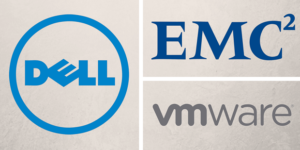This website uses cookies so that we can provide you with the best user experience possible. Cookie information is stored in your browser and performs functions such as recognising you when you return to our website and helping our team to understand which sections of the website you find most interesting and useful.
Yesterday, September 7, 2016, the EMC² logo disappeared. It’s hard for me to imagine that one of the greatest tech marketing companies of all time is suddenly gone. Yes, I know it lives on under Dell Technologies as DellEMC, but the impressions I have of the two companies side by side are so disparate that I’m still having trouble seeing how one blends into the other.
 I also wonder about the future of VMware under the Dell Technologies umbrella. VMware, Joe Tucci’s most prescient acquisition of the many he made, will continue to maintain its independent identity and further develop its own ecosystem. That’s a good thing. VMware’s clout, as evidenced by the 24,000 attendees at last week’s VMworld 2016 event, is now a formidable force in computing. But can Dell sustain VMware’s forward momentum as a Dell Technologies brand?
I also wonder about the future of VMware under the Dell Technologies umbrella. VMware, Joe Tucci’s most prescient acquisition of the many he made, will continue to maintain its independent identity and further develop its own ecosystem. That’s a good thing. VMware’s clout, as evidenced by the 24,000 attendees at last week’s VMworld 2016 event, is now a formidable force in computing. But can Dell sustain VMware’s forward momentum as a Dell Technologies brand?
At the show last week, press and industry analysts were treated to a private Q&A session with Michael Dell and Pat Gelsinger, CEO of VMware. Pat was asked who he thought was VMware’s major competitor. Without pausing to reflect, Gelsinger’s immediate answer was Microsoft. He noted that he sees Microsoft “everywhere.” For me, watching Michael Dell who owes much of his success to Microsoft, Gelsinger’s perception is worth serious reflection.
VMware is an enterprise IT virtualization play. Its founders saw early on that software could be used to transform commodity hardware into servers, networks and storage as separate entities or as all three combined. Indeed, entire data centers could be virtualized. And now, virtualization is a core enabler of cloud computing.
A single piece of software called a hypervisor was critical to VMware’s success. VMware stood up its hypervisor, now called ESXi, early and to widespread acceptance. Microsoft tried to emulate that success with its own hypervisor—Hyper-V—but VMware had already established an overwhelming dominance with ESX. So VMware won, right? Then why does Gelsinger now see the venerable Microsoft as a major competitor today?
The answer can be summed up in three words: enterprise cloud computing. Cloud is the new playing field and here, Microsoft has a distinct advantage for two reasons.
- As enterprise IT pushes cloud computing strategies forward, most envision a hybrid cloud end state—one that integrates public clouds with private cloud resources. Public clouds are great for simplicity and agility. But control, customization and cost are perceived to be issues that can be solved with a private cloud. So no matter where business users go, the hybrid cloud can offer simplicity and agility with control.
- Microsoft Azure is the fastest growing public cloud. Its growing faster that Amazon Web Services (AWS). Enterprise IT is increasingly coming to the conclusion that supporting Windows apps on premises is like rolling a boulder up a hill only to see it roll back down again whenever Microsoft releases a new version of Windows that forces them to change thousands of servers, desktops and laptops from the old release to the new one. Isn’t it much simpler and more agile to just run the apps in Azure where Microsoft does the heavy Windows lifting?
On the cloud playing field, Microsoft dominates VMware whose public cloud offering—vCloud Air—is struggling. Next year, Microsoft will deliver Azure Stack as a new hybrid cloud solution that integrates customer premises private clouds based on Microsoft software with Microsoft’s Azure public cloud service. Azure APIs are consistent regardless of where the resources are provisioned—on or off premises—making Azure Stack an extension of Azure. As a result, application developers can write once and deploy to either Azure or Azure Stack.
At the foundation of Azure Stack is Hyper-V. Therefore, Microsoft gets to pit its hypervisor against VMware’s once again, and this time on the still nascent hybrid cloud playing field. As Microsoft CEO Satya Nadella stated in a video heralding the close of the merger, Microsoft and Dell have a rich history of partnering together, one that he looks to continue and expand into cloud computing. So it’s all good on the surface. But if VMware’s prime competitor wins at the expense of VMware, one of Dell’s biggest assets is devalued.

